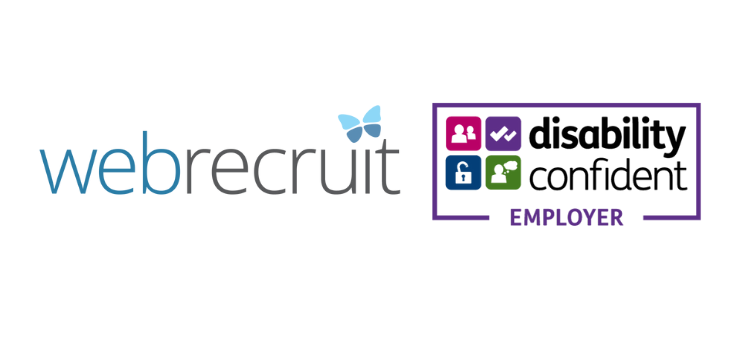The UN International Day of Persons with Disabilities (IDPD) is almost upon us (Friday 3rd December 2021), reminding everyone of the importance of encouraging inclusivity and accessibility in all works of life, as well as in the workplace.
The IDPD is designed to promote action in all sections of society to raise awareness about disability issues and to draw attention to the benefits of an inclusive and accessible society for all.
So, how can you practically commit to and evidence your support of disability confident initiatives in the workplace? Recently, Webrecruit was accredited as a Disability Confident Employer, in recognition of our support in making our workplace accessible and inclusive, and we strive to encourage our clients to do the same via the work we do with Job Advertisements and Webrecruit ATS, our inhouse Applicant Tracking System.
Top tips for creating a Disability Confident workplace
So, what practical things can you do? Read on for some practical tips about what you can do in the workplace, from recruitment to onboarding to day-to-day operations.
Be Disability Confident from the beginning. Being Disability Confident as an employer starts from your job advertisements and how you recruit. For example, from a job advertisement perspective, make sure your language is jargon-free and in clear English and advertised on websites, where possible, that have accessibility options to support as wide a candidate pool as possible. If you are accredited as a Disability Confident Employer, make this clear in your job advertisements and highlight you can make adjustments, where reasonable, to the recruitment and hiring process.
Interviews play a significant part. Interviews and selection process fairness is vital to being truly Disability Confident. Some organisations will offer a job interview to all disabled people who meet the minimum criteria; whilst this is not compulsory, it does provide disabled people with a heightened chance of being able to showcase their skills and suitability for a role. It is also important to highlight that you can make adjustments to the recruitment process for disabled applicants, where reasonable, and that you can offer alternative methods and inroads into the workplace, such as work trials. It is also important to make sure that all involved in the recruitment/hiring process are fully aware of any adjustments you can make, as well as alternative selection methods that may be available.
Onboarding – Support & Train. Getting the hiring process is important as a gateway for disabled persons to access the workplace; however, hiring is such a small part, and any onboarding and training programme must be fit for purpose. Where possible, it is key that all training and hiring managers have access to internal policy guidance regarding what adjustments your organisation will make in the workplace for both training and day-to-day duties. There is a lot of support out there regarding how to access and implement adjustments to make your workplace Disability Confident.
Retention & Engagement. In addition to reasonable adjustments being made in the workplace, policies that support guidance around sickness-related absence are important; it is important that all employees, including disabled persons, feel supported and understood should they not be able to attend work due to an underlying disability or health-related issue. Access to Work and Occupational Health can be important partners to keep in mind as part of your ongoing commitment to employed disabled persons in the workplace and ensuring your mentoring and coaching schemes are truly fit for purpose and accessible to all will support engagement and retention.
As of November 2021, Webrecruit has been accredited as a Disability Confident Employer. If you would like to find out more about this scheme, please click here.





